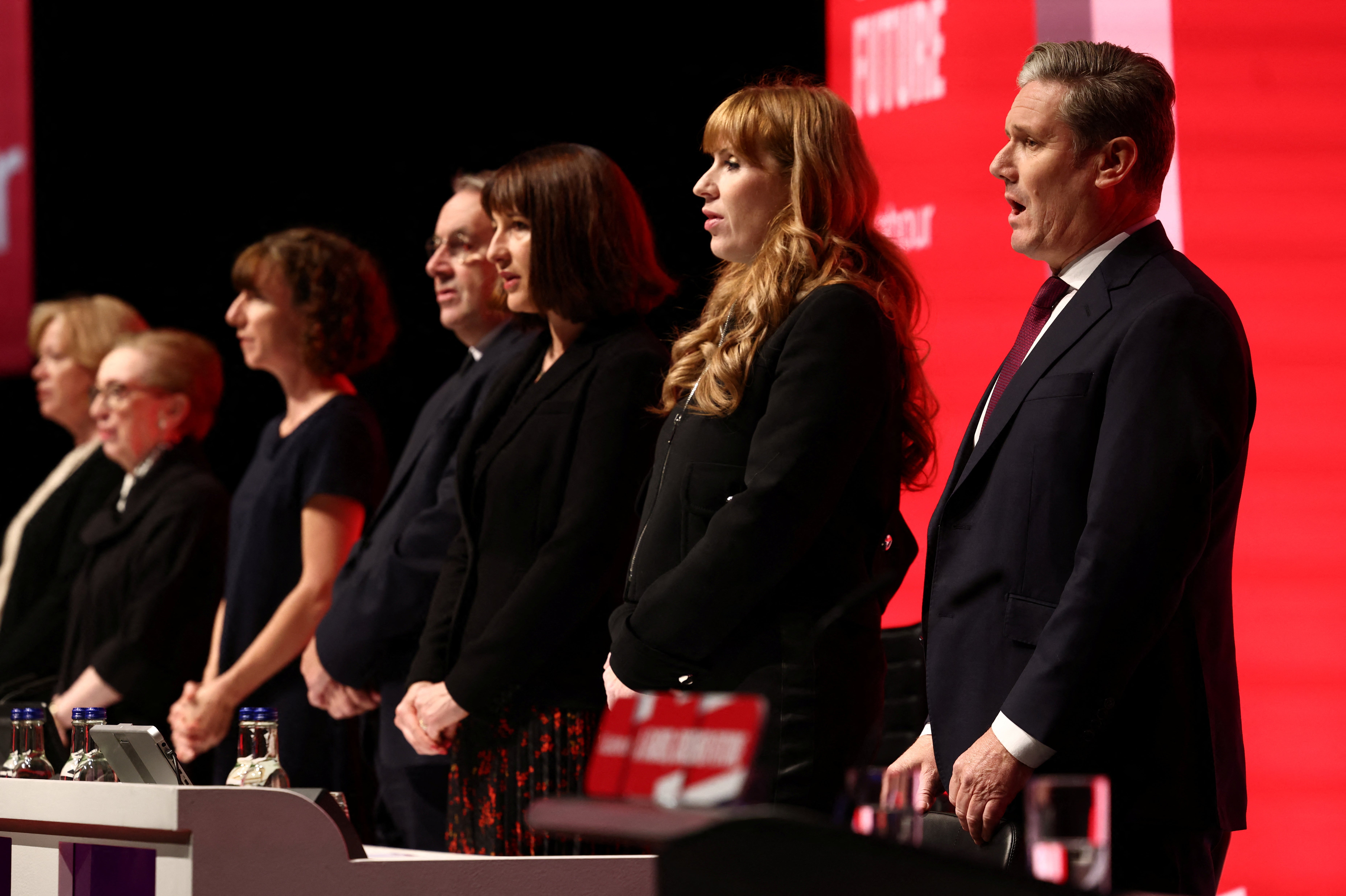The government is throwing away a vital electoral asset
Editorial: Gifted with a manically irresponsible Tory chancellor, Labour is now the party of fiscal responsibility

Though they’re not quite ready to sing “God Save the Keir”, members of the Labour movement gathered in Liverpool under a huge video banner of Elizabeth II were content to belt out “God Save the King”. To the intense relief of conference organisers, there were no heckles.
It was certainly an unusual moment – the national anthem has never been a regular fixture at the meetings of any political party, except perhaps those of Ukip – but it was an unfortunate necessity in a world in which the Conservatives have kidnapped the union jack, Brexit is equated with patriotism, and Labour has been called “anti-British”. Absurd as all of this is, it needed scotching.
More to the patriotic point, Labour leaders have made some solid and fairly obvious policy proposals in the national interest. On the economy, and on a new “green” foreign policy championed by David Lammy, Labour is showing it has some fresh ideas based on common sense.
Gifted with a manically irresponsible Conservative chancellor, Labour is now the party of fiscal responsibility. The British public have long been solemnly informed by Tory politicians that Labour stands for reckless borrowing and the “magic money tree”; true or not, the roles have now been reversed.
Few, and certainly few in the financial markets, believe that the Kwarteng dash for growth will succeed. Mr Starmer and his shadow chancellor are there to sound rather more grown up, sensible and prudent. It takes a moment to appreciate the true enormity of what Mr Kwarteng and Liz Truss are doing to the Tories’ claim to represent sound economic management – a matter in which they have traditionally enjoyed healthy poll leads.
When they lose that particular electoral asset, as they did in the 1970s and 1990s, electoral oblivion is near inevitable. It’s hard to believe it is being discarded for the sake of tax cuts for the super-rich – those whose wealth is way beyond that of most of the Tory membership – but there it is.
Mr Starmer probably got the balance right in promising to reverse the gratuitous and offensive reduction in the top (or “additional”) rate of tax for those earning £155,000 a year or more, but not to increase the basic rate from its new level. People in the very wide basic-rate band – which includes a large proportion of the working population – will continue to feel the financial squeeze for some years ahead. Even if the tax cut was unwise in the current inflationary circumstances, a case can be made for broad assistance across the income spectrum: the 19 per cent rate could be retained while pushing more help towards the most vulnerable.
The most important economic message, however, is that long-term sustainable growth cannot be secured by giving tax cuts to the already wealthy – and by targeting them, bizarrely, at bankers on six- or seven-figure bonuses. Rachel Reeves is right to leave most of her options open in such volatile times, and to reserve some room for manoeuvre. She is also politically astute enough not to fall into the trap the Tories have laid by giving credence to the idea that all Labour would do in government is hike taxes.
Angela Rayner’s slippage on this point after the mini-Budget allowed Mr Kwarteng a rare opportunity, but this has been swiftly closed down. The Conservatives are doing all they can to help Mr Starmer’s party to present itself as one of common-sense economics and social justice, but Labour still needs to display some consistency and discipline if the public are to trust it to see them through hard times.
The “green growth” agenda will help – but the danger is that Labour is again thought to be obsessed with wealth distribution at the expense of wealth creation. There have been too many failed plans for growth under this government; Labour needs its own plan, and one that shows how it, too, would reward enterprise and entrepreneurship and boost productive private investment.
Though somewhat overshadowed by the urgent economic questions, Labour is still right to attend to the transcendent challenge of climate change. It should infuse all of the party’s policymaking, just at the moment when Ms Truss is jettisoning the remains of Boris Johnson’s environmentalism.
To keep up to speed with all the latest opinions and comment, sign up to our free weekly Voices Dispatches newsletter by clicking here
Where once the late Robin Cook pledged an “ethical dimension” to New Labour’s foreign policy, now David Lammy echoes that by placing the fight against climate change at the heart of a new administration’s international relations. The shadow foreign secretary is committing the party to “a foreign policy with a green dimension”, in contrast to that of the Conservatives.
Mr Lammy, of necessity, has had to spend much of his time expressing warm cross-party approval of the government’s support for Ukraine, and avoiding discussion of Brexit at all costs; his latest initiative allows him to put some clear green water between his party and the Tories.
So the Labour Party starts its conference with a better sense of its role in life than has sadly been the case in recent times. It now seems ready to see itself as an alternative government. Moving out of protest mode and into government-in-waiting mode hasn’t come easily, and the enthusiastic, blanket approval of recent strike action shows that the transition is far from complete. Labour cannot, for example, persist with a “Martini” approach to industrial relations – backing the trade unions any time, any place, anywhere.
It must always place the national interest first. On economic policy and on the environment, it is showing that it’s capable of doing that. But there is still more to do.






Join our commenting forum
Join thought-provoking conversations, follow other Independent readers and see their replies
Comments